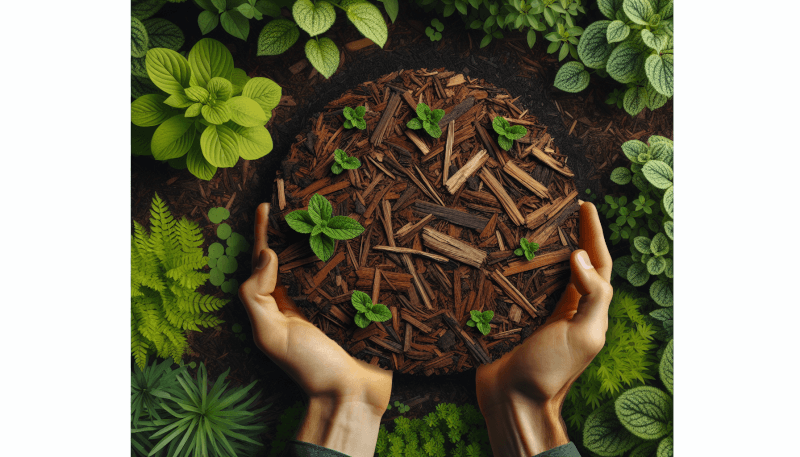Have you ever wondered how to make your urban garden flourish? Look no further than mulching! Mulching is a simple and effective technique that can revolutionize your gardening game. By spreading a layer of organic materials over the soil surface, such as leaves, wood chips, or grass clippings, you can unlock a world of benefits for your plants. From conserving water to preventing weed growth and improving soil fertility, mulching has it all. In this article, we will explore the advantages of mulching in urban gardening and discover how this practice can transform your green oasis into a thriving haven for plants. So let’s dig in and uncover the secrets of mulching!

Reducing Weed Growth
Blocking Sunlight
One of the main benefits of using mulch in urban gardening is its ability to reduce weed growth. When you apply a thick layer of mulch to your garden beds, it blocks sunlight from reaching the soil underneath. This creates a barrier that prevents weed seeds from germinating and growing.
Suppressing Weed Seeds
In addition to blocking sunlight, mulch also helps suppress weed seeds. As organic mulch breaks down over time, it releases natural chemicals and compounds that inhibit weed seed germination. This means fewer weeds will sprout in your garden, making it easier to maintain and keep clean.
Retaining Moisture
Another advantage of using mulch is that it helps retain moisture in the soil. Mulch acts as a protective layer that slows down the evaporation process, allowing water to stay in the root zone where plants can access it. This can be especially beneficial in urban gardening, where water resources may be limited.
Conserving Water
Retaining Moisture
Mulch plays a crucial role in conserving water in urban gardening. By retaining moisture in the soil, it reduces the need for frequent watering. The mulch layer acts as a barrier between the soil and the air, preventing water from evaporating too quickly. This not only saves you time and effort but also contributes to overall water conservation efforts.
Reducing Evaporation
In addition to retaining moisture, mulch also helps reduce evaporation. When sunlight hits bare soil directly, it causes water to evaporate rapidly. By applying a layer of mulch, you create a shield that blocks the sun’s rays and slows down the evaporation process. This means less water is lost to the atmosphere, resulting in more efficient water usage in your urban garden.

Improving Soil Quality
Adding Organic Matter
One of the significant benefits of using mulch is its ability to improve soil quality. Organic mulches, such as wood chips or compost, gradually break down over time and add valuable organic matter to the soil. This organic matter improves soil structure, enhances its ability to hold water and nutrients, and provides a favorable environment for beneficial soil microorganisms.
Enhancing Nutrient Levels
Mulch can also help enhance nutrient levels in the soil. As organic mulch decomposes, it releases essential nutrients that can be absorbed by the plants’ roots. This gradual release of nutrients over time ensures a steady supply for your urban garden, reducing the need for additional fertilizers.
Promoting Soil Microorganisms
By providing a layer of mulch, you create an ideal habitat for soil microorganisms. These beneficial microorganisms play a crucial role in breaking down organic matter, releasing nutrients, and improving soil health. Mulch acts as a protective layer that shields the soil and its microorganisms from extreme temperatures and other environmental stressors, creating a thriving ecosystem below the surface.
Regulating Soil Temperature
Insulating Soil
Another advantage of using mulch is its ability to regulate soil temperature. In urban gardening, where temperature fluctuations can be more pronounced, mulch acts as insulation for the soil. It helps to keep the soil temperature more stable, protecting the roots of your plants from extreme heat or cold.
Protecting Roots from Extreme Temperatures
Mulch acts as a buffer, shielding plant roots from extreme temperatures. In hot summer months, mulch provides a cooling effect, preventing the soil from becoming too hot and damaging the delicate root systems. During colder seasons, mulch acts as a barrier, preventing frost and freezing temperatures from penetrating the soil and potentially harming the roots.

Preventing Soil Erosion
Shielding Soil Surface
Mulch plays a vital role in preventing soil erosion in your urban garden. The layer of mulch acts as a protective shield, preventing heavy rain or irrigation water from directly hitting the soil surface. By breaking the force of the water, mulch reduces the likelihood of soil particles being carried away by runoff, thus reducing erosion.
Minimizing Water Runoff
In addition to shielding the soil surface, mulch also helps minimize water runoff. When rain or irrigation water hits bare soil directly, it can lead to wasteful runoff, carrying away precious topsoil along with it. By applying mulch, you create a porous and absorbent layer that allows water to infiltrate the soil slowly, reducing runoff and conserving the valuable soil in your urban garden.
Enhancing Aesthetic Appeal
Providing a Neat Appearance
Mulch adds a finishing touch to your urban garden and provides a neat and tidy appearance. The uniform layer of mulch creates a polished look, enhancing the overall aesthetics of your garden beds. Whether you choose a natural wood chip mulch or a decorative option like colored gravel, mulch can complement your garden design and make it visually appealing.
Creating a Cohesive Landscape Design
Mulch can also help create a cohesive and unified landscape design in your urban garden. By choosing a specific type and color of mulch that complements your plant selection and overall theme, you can tie together different elements of your garden. This creates a harmonious and well-designed outdoor space that is visually pleasing and enjoyable to spend time in.
Decreasing Maintenance Needs
Reducing Weeding
Mulch significantly reduces the need for frequent weeding in your urban garden. The layer of mulch acts as a barrier, preventing weed seeds from germinating and penetrating the soil. With fewer weeds to contend with, you’ll spend less time pulling them out, allowing you to focus on other aspects of garden maintenance.
Watering, and Fertilizing
By retaining moisture and enhancing nutrient levels in the soil, mulch reduces the need for excessive watering and fertilizing. The slow release of moisture and nutrients from decomposing mulch means you won’t have to water as frequently or rely heavily on synthetic fertilizers. This not only saves time and effort but also promotes a more environmentally friendly and sustainable gardening approach.
Suppressing Diseases
Creating Physical Barrier
Mulch acts as a physical barrier that can help suppress diseases in your urban garden. When applied properly, mulch prevents soil-borne diseases from splashing onto the plants’ leaves during heavy rain or irrigation. By minimizing contact between the soil and the plant, you reduce the risk of diseases spreading and damaging your plants.
Reducing Soil Splashing
Another way mulch helps suppress diseases is by reducing soil splashing. When rain or irrigation water hits bare soil directly, it can cause soil particles to splash onto the lower leaves of your plants. This can introduce pathogens and increase the risk of disease development. By applying mulch, you create a protective layer that absorbs the impact of water, minimizing soil splashing and lowering the likelihood of disease outbreaks.
Encouraging Beneficial Insects
Providing Habitat
Mulch provides an ideal habitat for beneficial insects in your urban garden. These insects, such as ladybugs, lacewings, and ground beetles, are natural predators that help control pests like aphids and caterpillars. By creating a diverse and thriving ecosystem with the help of mulch, you can attract and support these beneficial insects, reducing the need for chemical pesticides.
Attracting Pollinators and Natural Predators
Not only does mulch provide habitat for beneficial insects, but it also attracts important pollinators like bees and butterflies. These pollinators play a crucial role in the reproduction of many plants, including fruits, vegetables, and flowers. By creating a welcoming environment with the use of mulch, you can attract these pollinators to your urban garden and foster a healthy ecosystem.
Promoting Sustainable Urban Environment
Supporting Biodiversity
By using mulch in your urban garden, you contribute to supporting biodiversity in your local environment. Mulch provides a sheltered habitat for a variety of living organisms, including microorganisms, insects, and earthworms. This promotes a diverse and balanced ecosystem that is essential for the long-term health and sustainability of urban environments.
Reducing Soil Degradation
Mulch helps reduce soil degradation in urban gardening. By protecting the soil surface from erosive forces like rain and wind, mulch helps maintain the integrity of the soil structure. This prevents soil erosion and ensures that the soil remains fertile and capable of supporting plant growth.
Mitigating Urban Heat Island Effect
Urban areas often experience the urban heat island effect, where concrete and other impermeable surfaces absorb and retain heat, leading to higher temperatures. Mulch can help mitigate this effect by providing a cooling effect to the soil. By insulating the ground and reducing temperature fluctuations, mulch helps create a more comfortable and sustainable urban environment.
In conclusion, the use of mulch in urban gardening provides numerous benefits. From reducing weed growth and conserving water to improving soil quality and regulating soil temperature, mulch plays a crucial role in creating a sustainable and visually appealing urban garden. Additionally, mulch helps prevent soil erosion, suppress diseases, encourage beneficial insects, and promote a biodiverse and resilient urban environment. So, next time you plan your urban garden, consider the advantages of mulching and watch your plants thrive in this eco-friendly and low-maintenance gardening approach.


